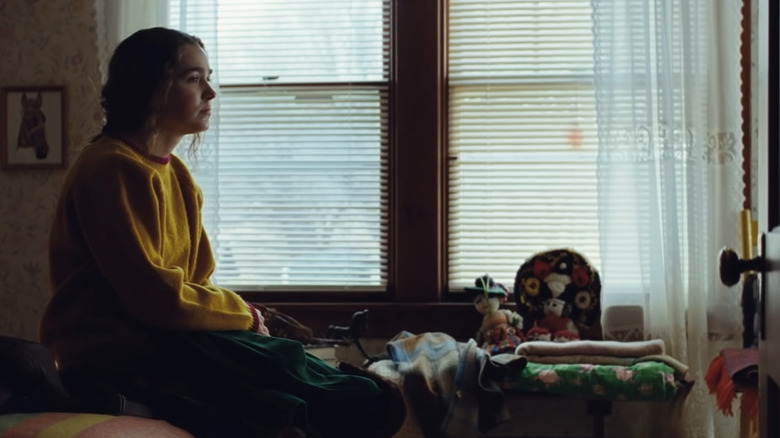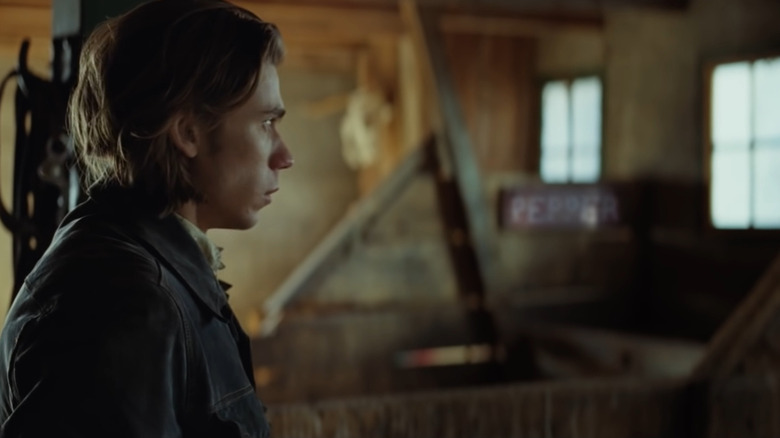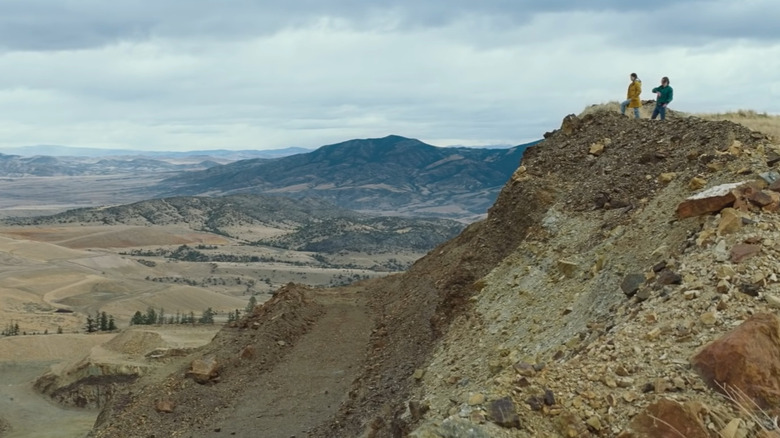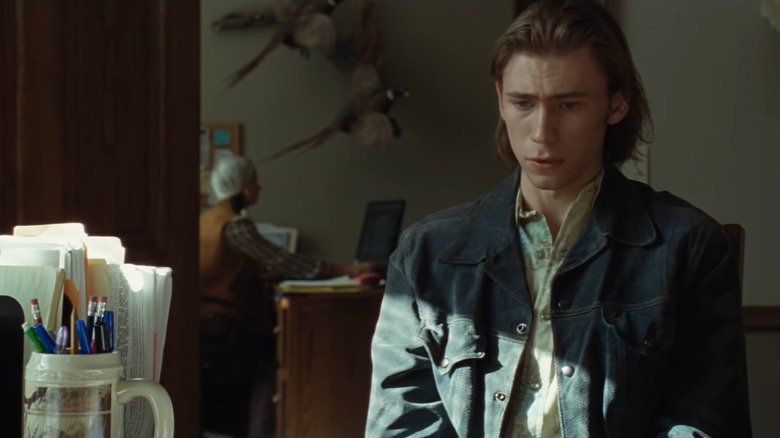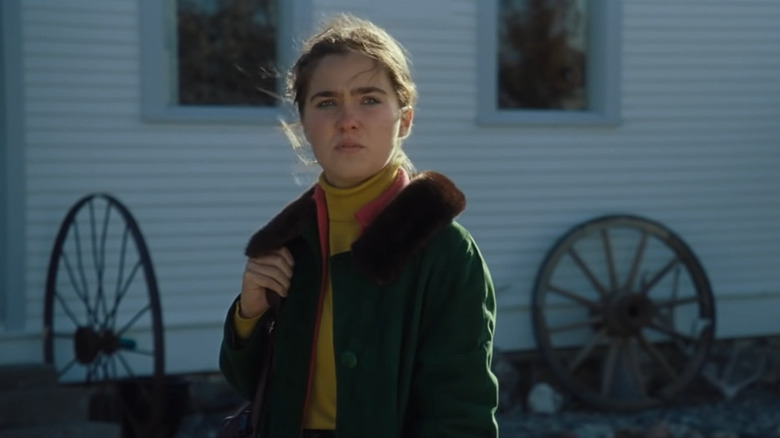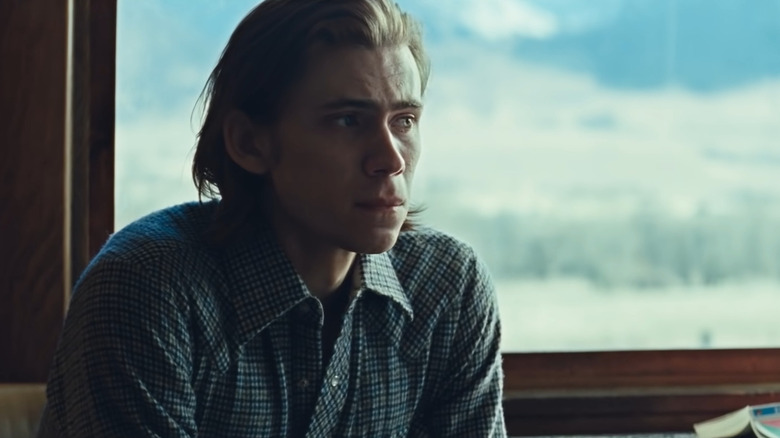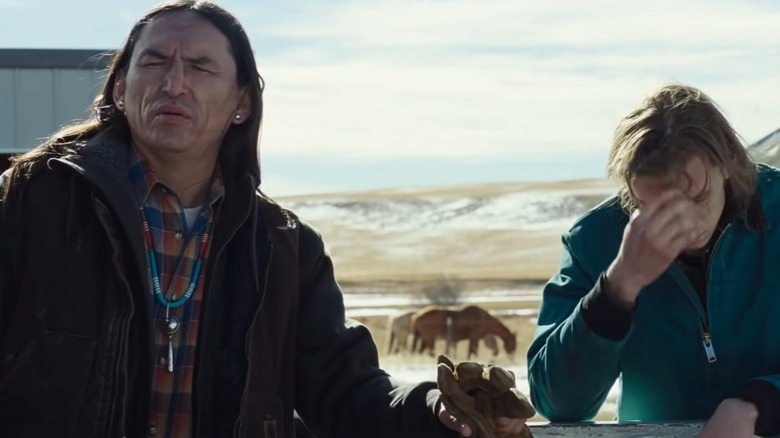Montana Story Directors And Cast Talk Fighting With Nature And Building A Family [Interview]
When faced with the challenge of making a film during the height of the Covid pandemic, the makers of "Montana Story" had a novel approach: Get as far away from other people as possible, and shoot in the most remote corners of sparsely populated Montana. There, the team behind this independent drama crafted an intimate story about family, trauma, reconnection, and catharsis.
Haley Lu Richardson and Owen Teague play a pair of siblings who have been estranged for years only to be reunited as their father's health deteriorates, forcing them to return to the family ranch and face old, still-bitter conflicts. When "Montana Story" made its premiere at the Toronto International Film Festival in 2021, I had a chance to sit down with writers/directors Scott McGehee and David Siegel (as well as stars Richardson and Teague) to discuss the making of their latest film, which is finally being released this Friday.
This interview has been lightly edited for clarity and brevity.
'We were working on another movie'
For David and Scott, you guys worked on this project from beginning to end: You wrote and directed it. What was the inspiration? How did this idea come into being?
Siegel: We were working on another movie that we thought was going into prep in March [2020], and it got shut down because of the pandemic. And we spent a number of months trying to get that back on its feet. And at a certain point, I realized that it probably wasn't going to happen. So it was in the middle of the summer that we started thinking about or wondering whether there was a story in us to write that we could shoot in a place that was relatively isolated, that we could take a small group of people, cast and crew, and [we] started noodling on ideas that we think really sort of emerged from the pressures that we were all feeling in the middle of 2020 as the pandemic settled in, and "Montana Story" sort of grew out of that.
'You couldn't hide there as actors'
How was it shooting for all of you guys at these gorgeous natural locations? That must have been a really nice respite from everything else going on.
Teague: Yeah, it was beautiful. We've talked a few times about just how being in Montana affected us in making the film. It really opened me up in a way that I wasn't expecting. Just the scenery is — not the scenery, but the environment, just being in that kind of massive, wide open ... you [Haley] put it really well: You said you can't hide there, which is kind of scary, but it's also really kind of nice if you're acting.
Richardson: Yeah, you couldn't hide there as actors. And also, Cal and Erin, being back home in that world, it's hard to hide how you're really feeling. There's something about Mother Nature that'll do that to you.
Siegel: I was just thinking that there's a lot of push and pull in the movie, there's a lot of dualities that are playing off each other. I hadn't really thought about this before, but Montana was ridiculously beautiful and being there, everything that Haley and Owen were saying is really true. But we got hit by a lot of really bad weather and a lot of wind, really harsh wind, that we weren't really fully expecting, which we really loved in the movie. So the place itself was a kind of push and pull too, because it went back and forth between being both kind of an idol and also something to endure and I think that was interesting.
Richardson: That's so poetic. What you just said.
Teague: The first weekend I was up there, it was like 72 degrees during the day, Fahrenheit, it was great. You could wear a T-shirt outside. Then literally the next week, it was 10 inches of snow.
Richardson: Owen and I literally had to hug constantly...
Teague: Cuddle, like penguins...
Richardson: Literally, never been closer to a human. And then the second they would say, "Action!" we would just hug one more second and then do the scene.
Teague: "Okay, okay, and alright, now we're going."
Richardson: Yeah, and that was with coats and heaters and everything else.
I'm from Buffalo, so I know something about that.
Richardson: I'm from Phoenix, Arizona. So I was not prepared.
Teague: And I'm from Florida, so I was also not prepared. [laughs]
McGehee: The airport scene at the end of the movie was written as a scene that took place at the curb at the airport. And we actually, the last minute had to move most of the scene inside the car because it was zero degrees outside.
'Owen and I just became brother and sister'
For Owen and Haley, I feel your characters have such an interesting dynamic because there's so much shared history, but at the same time as adults, you're essentially strangers. How did you guys build out that relationship?
Richardson: Honestly, I feel like Owen and I just became brother and sister, and I don't know how to describe that, but that just happened. And I feel like — we both feel this way — that we read these characters and they felt so whole to us. You immediately understood Cal and I immediately got Erin and felt her and saw her. And so when you're lucky enough to just form a connection with the person you're working with that feels like you can be safe and feel that dynamic and energy and that love for each other that they deeply, so much have, we felt that as humans and then we understood the characters because they were written so beautifully and completely. Then we just showed up to work and acted.
Teague: We did it.
Siegel: We talked about this when we were in Montana, but we were talking about this recently again. When you cast actors playing characters who have very specific kinds of relationships, you're mostly imagining what the chemistry will be between them, unless they're able to really audition extensively together, and two people like Owen and Haley in their 20s, good-looking people who are supposed to be brother and sister, those two people might wind up having very sexual chemistry as opposed to familial chemistry...
[laughter]
Siegel: As Haley put it so eloquently, they just immediately had this familial relationship, and we just got very lucky.
Teague: Yeah.
Richardson: Yeah, that's good. He's my little big brother.
Teague: Yup.
'There's so much fight between them and so much unsaid and so much that's built'
Did you guys have any trouble having some distance between you? It seems you guys have a really good, friendly chemistry together. Was it hard to, when the cameras were rolling, to not put that there?
Richardson: That wasn't hard.
Teague: No, it wasn't.
Richardson: I think it's because ... I've worked with people who, whether they're the director or another actor, who I feel like have this mindset that, if there's tension or if there's an emotional scene, you have to make it really hard for the other person. You have to not like them or whatever, to make that the best it can be. But actually I felt that's very far from the truth. For me, the safer I feel and the more connected and trusted I feel to someone that I'm working with in such an intimate way — like, acting is kind of ridiculous. We have to make up all of these things, and then we have to scream and cry, and then we have to do it 10 more times and then have to do it 10 more times. That's kind of ridiculous. So to get to that place where you really feel comfortable doing that and feel safe doing that, because it's so intense, to get yourself to do those things, doing it within an environment with a person who you feel safe with and love and know you can rely on is rare and also makes it so much easier.
Teague: Makes it so nice. Yeah, I mean, I think because we were so close as friends.
Richardson: Siblings.
Teague: Siblings. [laughs]
Richardson: Can't forget. [laughs]
Teague: It made that tension and made that sort of hurt much easier to get to and feel okay about it, because otherwise it would have just been miserable.
Richardson: Because also even though there's so much fight between them and so much unsaid and so much that's built...
Teague: There is still ... love, yeah.
Richardson: There's love, that all comes from this love. So even before really high tension scenes that we had in the movie, we would just hug a lot [laughs], for warmth and for emotional reasons. But we would just hug before those scenes and then we'd yell at each other [laughs], cry. Just knowing that you have that connection, that love is there first...
Teague: And that you're safe to do that, go there and put everything into it and possibly also really suck.
Richardson: And look like an idiot.
Teague: And look like an idiot, which sometimes, it's part of acting. [laughs] But having someone who you trust and who is like, "Yeah, I get it."
'There are few actors who can really pull that off in the circumstances we asked them to do it in'
That feels much healthier, because I've heard of sets where if there's a character who's supposed to feel isolated from other people, they'll bring them in a month later, just so that everybody else has a bond and then they're kind of the odd man out. And that feels really sad to me.
Richardson: So then that person, you're not trusting them as an actor, then, because they're an actor. [laughs] I don't know.
Siegel: I have to add that it's a testament to each of their talent as actors to be able to do that because — and it's bringing me back to thinking about the mine scene, which was the very first scene that we shot. With the wind and the cold, it was pretty wicked. And when I see the movie, I think often of the moment when Erin turns around and says, "You know what the bottom of the pit is reserved for?" And she turns and she looks at her brother, those two shots, those opposing shots of her staring at him, because it's the first time she's really given him ... just beads, headlights right in his eyes. And says, "It's reserved for people who betray their community or their kin." And the shot on Cal, Owen: It's like he took it with both barrels in the chest. And the look on each of their faces, it sums up the emotional bind of the movie so beautifully, but there are few actors who can really pull that off in the circumstances we asked them to do it in.
McGehee: On day one. Yeah.
Siegel: On day one.
Richardson: That was, the mine ... the circumstances of the mine scene were very hard, because the wind was so intense and I'm five feet tall. So I'm very small and the wind was so intense and we were literally standing — I mean, we weren't in a dangerous area where we were literally gonna fall in, but I mean, anything could've happened. So I literally had to stand — we had to take a stance, because it got progressively windier throughout the day, so by our close-ups, we had to stance and we were all rocking like this. That was hard.
Teague: It was, what? 30 to 40 mile an hour winds or something like that? Maybe more? It was insane.
Siegel: Ten hours. It was like you were bludgeoned. [laughter]
Richardson: I was squeezing my butt cheeks so hard to not fall into the mine.
Teague: Yeah, I honestly don't know how — we had this amazing sound guy named Mark, and I don't know how he got any of our lines.
Richardson: Good job, Mark.
'Place and home was something that we talked about a lot'
Trial by fire or extreme wind, I guess in that scenario, that's a lot. That's so much to contend with, all the normal set stuff and then also Mother Nature doing whatever she wants. I have one more question that I wanted to ask because I was thinking about how in other hands, I feel this could have been a very white movie, and I wanted to ask you guys, how important was it to you that there was representation of Indigenous people from the area and also a growing African immigrant community?
McGehee: That was something we liked about the story, we saw emerging kind of as we were doing it. It came very naturally to the telling of the story and kind of imagining that story in that landscape. It was a real pleasure.
Siegel: Place and home was something that we talked about a lot in making the movie, or in writing the script. And the way people migrate, the way Indigenous people who were there for thousands of years before white settlers. Who calls what place home, how people call a place home, how people adapt to new homes. When Mukki tells Erin that his people, they were Mohicans and they came from New York, that aspect of moving, always moving and calling a place home was something that we thought it was interesting to contemplate with a broad range of people. And for Erin and Cal, especially, because of what has happened with her father.
McGehee: And it made casting the movie such a pleasure, too. We got to know actors that we didn't know before who really filled out those roles. I mean, we were so delighted with the performances we got because they feel so rich and centered. Yeah, it was a pleasure.
"Montana Story" arrives in limited release on May 13, 2022.
